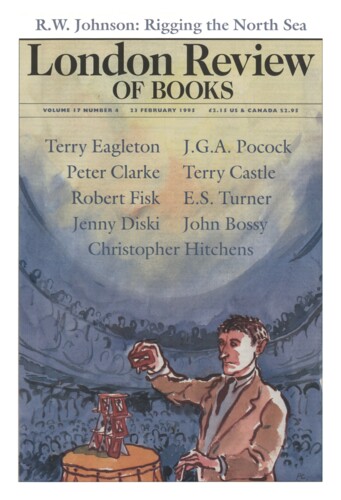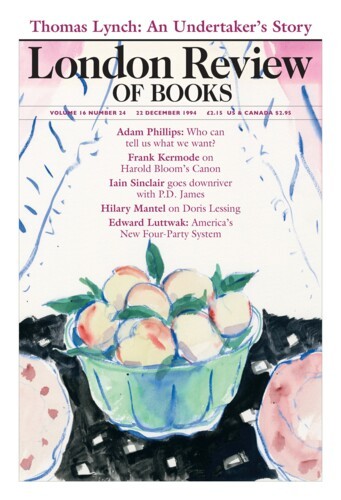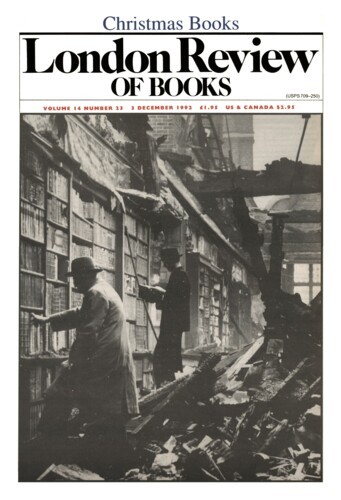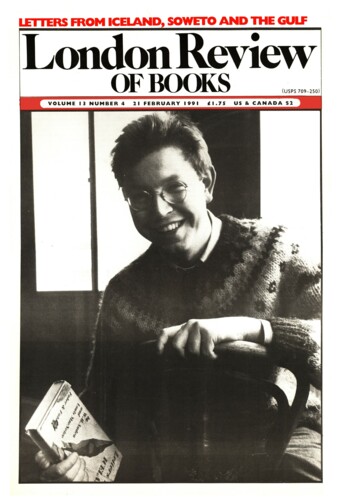Robert Fisk
Robert Fisk is Middle East Correspondent of the Times and has been based in Beirut for five years, covering the Middle East and Afghanistan. He is the author of The Point of No Return, on contemporary Ulster, and is writing a study of Anglo-Irish relations in the Second World War.
Remaining Issues
Robert Fisk, 23 February 1995
Selma Tawil brought the fifty-year-old keys into the room, sat down in her corner armchair and let them spill out of her hands onto the floor: heavy store-room keys, rusting cupboard keys, keys shaped like backbones for office safes, car keys for an old British-made Hillman, and one larger steel key with a three-and-a-half inch shaft, gun-metal grey with an elegant knot at one end and a broad, worn blade. Aunty Selma picked this key up in a hand spotted with age. She is 90 now and her facial skin hangs in folds, but her grey hair is pinned back in a neat bun and though her hearing is impaired, her memory is as sharp as it was the day she left Palestine. The key in her hand was the front-door key of her home in Haifa.
Advice to the Palestinians
22 December 1994
Poor Khaled
Robert Fisk, 3 December 1992
Prince Khaled bin Sultan bin Abdul Aziz, commander-in-chief of all foreign forces in the Gulf War, nephew of King Fahd, and son of the Saudi Defence Minister, Prince Sultan, used to employ an American public relations company to manage his press conferences. Deep in the high-pile carpeted interior of the Saudi Ministry of Defence, an Irish-American of massive build – a certain Mr Lynch from Chicago – would stand just behind Prince Khaled, choosing which journalists should be permitted to ask questions and suggesting to the rather portly Saudi commander how he should reply.
War Aims
Robert Fisk, 21 February 1991
‘What is the new world order?’ a Saudi preacher asked me the other day. Order is something the Saudis like the sound of. The world is an entity from which many Saudis are isolated. ‘New’ is a word which for Arabs has a suspicious, dangerous ring about it. I tried to explain what President Bush might have meant by the phrase, referring to the context in which it first appeared. The Cold War was over, Eastern Europe was free. The Americans obviously thought that these winds of change applied to the Middle East as well. Dictators were no longer going to be tolerated – certainly not dictators who opposed the wishes of the United States.’
Pieces about Robert Fisk in the LRB
Ariel the Unlucky
David Gilmour, 5 April 1990
1982 was a critical time for the authors of all four of these books. It was the year of Ariel Sharon’s most sanguinary foreign venture, which ended in massacre, failure, and a measure of...
De Valera and Churchill
John Horgan, 21 July 1983
When Michael Heseltine launched a not-too-oblique attack on Irish neutrality in the course of a visit to Northern Ireland on 4 May, he was – presumably – unaware of the fact that he...
Read anywhere with the London Review of Books app, available now from the App Store for Apple devices, Google Play for Android devices and Amazon for your Kindle Fire.
Sign up to our newsletter
For highlights from the latest issue, our archive and the blog, as well as news, events and exclusive promotions.




